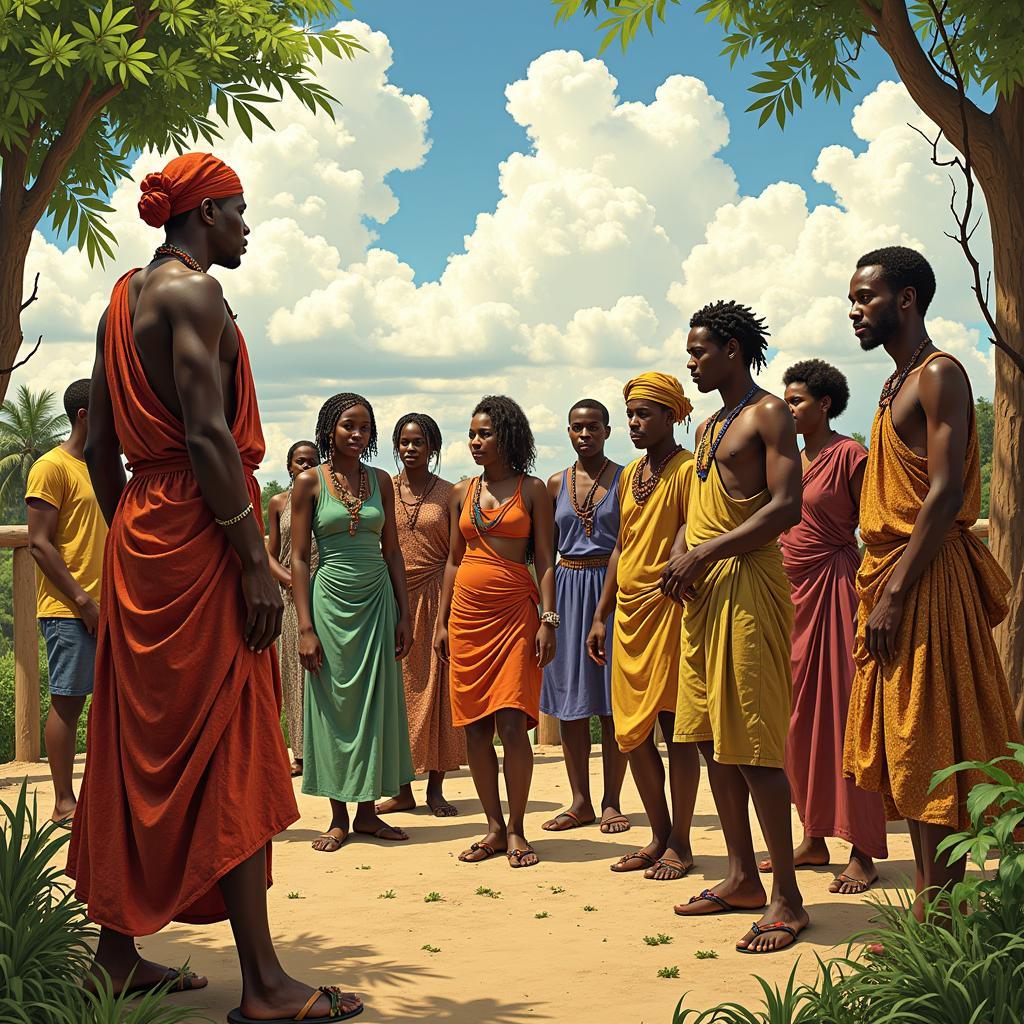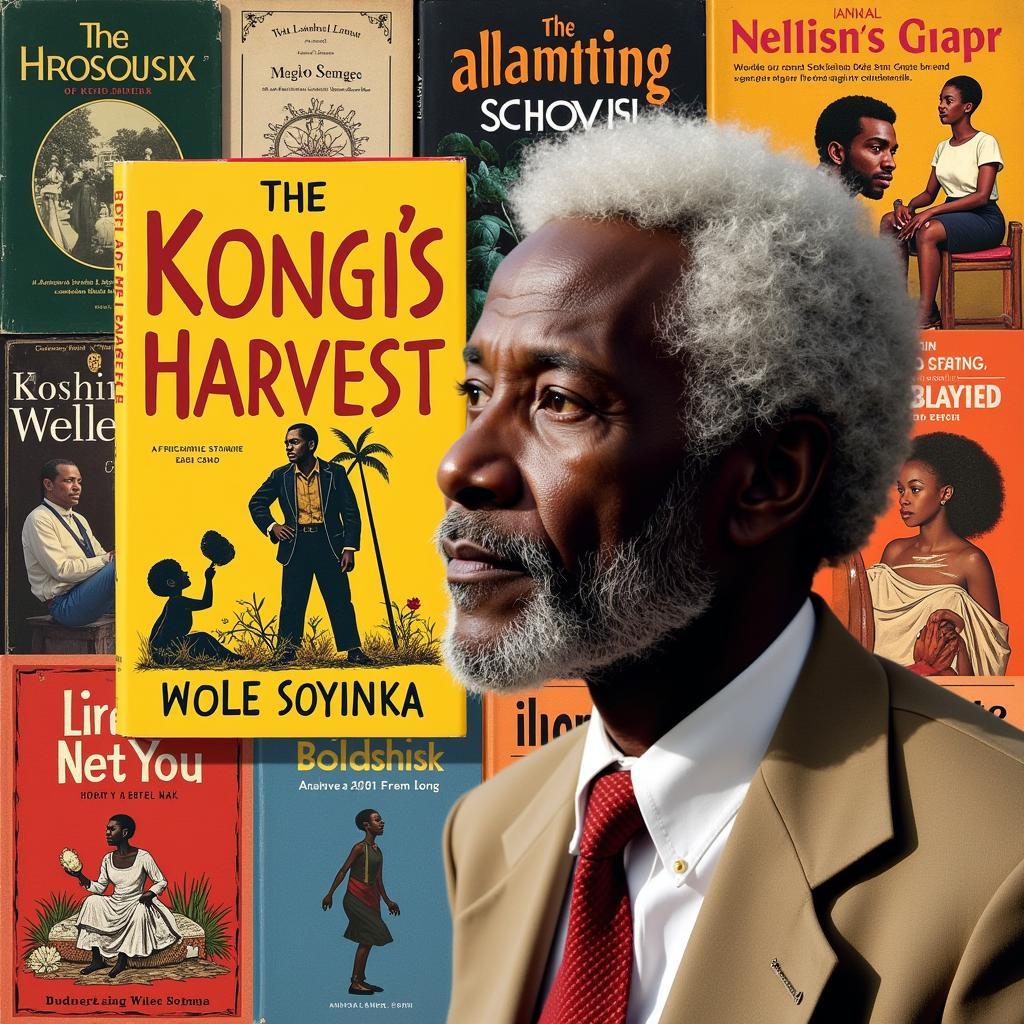Unveiling the African Experience in Kongi’s Harvest
Kongi’s Harvest offers a potent glimpse into the complexities of post-colonial Africa, exploring themes of power, tradition, and modernization. This literary masterpiece by Wole Soyinka delves into the heart of an African experience marked by the clash between indigenous cultures and imposed political structures.
The Clash of Tradition and Modernity in Kongi’s Harvest
Soyinka masterfully portrays the tension between tradition and modernity in post-colonial Africa through the fictional nation of Isma. Kongi, the tyrannical president, attempts to suppress traditional customs and impose his own brand of “modernization,” epitomized by the enforced “New Yam Festival.” This festival, a perversion of a cherished cultural practice, becomes a symbol of Kongi’s dictatorial control. The play highlights the struggle of a society grappling with its identity in the wake of colonial rule, torn between embracing the new and preserving the old. The characters’ responses to Kongi’s regime reflect the diverse perspectives within the community, showcasing the internal conflicts that arise from this clash of values.
The Political Landscape of Kongi’s Harvest: A Mirror to Post-Colonial Africa
The political landscape of Kongi’s Harvest reflects the turbulent realities of numerous post-colonial African nations. Kongi’s autocratic rule, marked by suppression of dissent and manipulation of tradition, mirrors the experiences of many countries struggling with the legacy of colonialism. The play explores the dangers of unchecked power and the fragility of newly independent states. The desire for self-determination is juxtaposed against the allure of authoritarianism, raising critical questions about the nature of leadership and the challenges of nation-building.
The Power of Language and Ritual in Kongi’s Harvest
Soyinka, a Nobel laureate in Literature, utilizes language and ritual as powerful tools to convey the african experience in Kongi’s Harvest. The play’s dialogue, rich with both English and Yoruba, reflects the linguistic complexities of a nation navigating its post-colonial identity. The manipulation of traditional rituals, particularly the New Yam Festival, underscores the significance of these ceremonies in shaping cultural identity and the devastating impact of their exploitation for political gain.
 Language and Ritual in Kongi's Harvest
Language and Ritual in Kongi's Harvest
Kongi’s Harvest and the Search for Identity
The search for identity is a central theme in Kongi’s Harvest. The characters grapple with their individual and collective identities in a society undergoing rapid transformation. The play explores the tensions between personal desires and societal expectations, highlighting the challenges of forging a new path in a world grappling with the remnants of colonial influence. Daodu’s internal conflict between his love for Segi and his loyalty to tradition exemplifies the personal struggles that mirror the broader societal challenges depicted in the play.
The Significance of Kongi’s Harvest in African Literature
Kongi’s Harvest holds a significant place in African literature. It stands as a powerful critique of political oppression and a poignant exploration of the challenges faced by post-colonial societies. Soyinka’s work remains relevant today as it continues to resonate with the ongoing struggles for self-determination and cultural preservation across the African continent. The play’s enduring power lies in its ability to spark dialogue about the complex interplay of tradition, modernity, and political power.
 Kongi's Harvest in African Literature context
Kongi's Harvest in African Literature context
In conclusion, the african experience in Kongi’s Harvest offers a multifaceted exploration of post-colonial Africa. The play’s enduring legacy lies in its insightful portrayal of the clash between tradition and modernity, the complexities of political power, and the ongoing search for identity in a world grappling with the legacies of colonialism.
FAQ
-
What is the central theme of Kongi’s Harvest?
The central theme is the clash between tradition and modernity in post-colonial Africa, manifested through political power and the search for identity. -
Who is Kongi in the play?
Kongi is the autocratic president of Isma, a fictional African nation. -
What is the significance of the New Yam Festival?
The New Yam Festival, a traditional harvest celebration, is manipulated by Kongi to symbolize his control and suppress cultural identity. -
Why is Kongi’s Harvest considered an important work of African literature?
It provides a powerful critique of post-colonial politics and the challenges faced by newly independent nations in Africa. -
What are some of the key themes explored in the play?
Key themes include the abuse of power, the struggle for cultural identity, and the tension between tradition and imposed modernity. -
How does Soyinka use language in the play?
Soyinka uses a blend of English and Yoruba to reflect the linguistic complexities of post-colonial identity. -
What is the significance of the character Daodu?
Daodu embodies the internal conflict between personal desires and societal expectations in a changing world.
Need support? Contact us 24/7: Phone: +255768904061, Email: kaka.mag@gmail.com, or visit us at Mbarali DC Mawindi, Kangaga, Tanzania.


